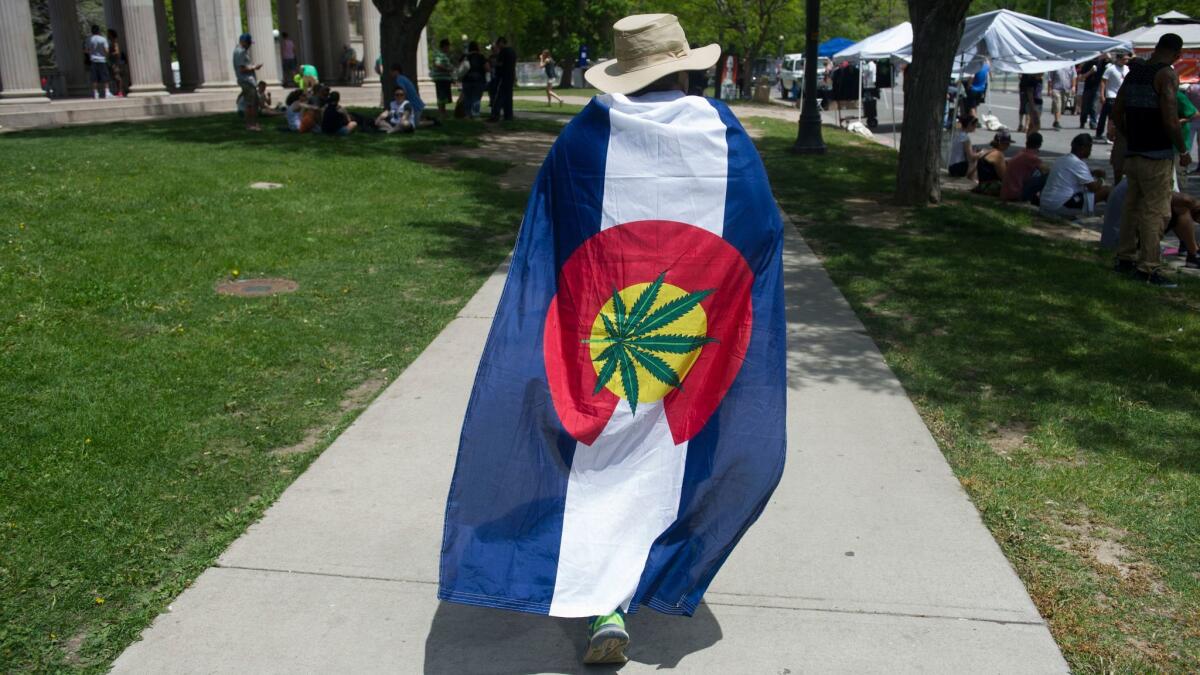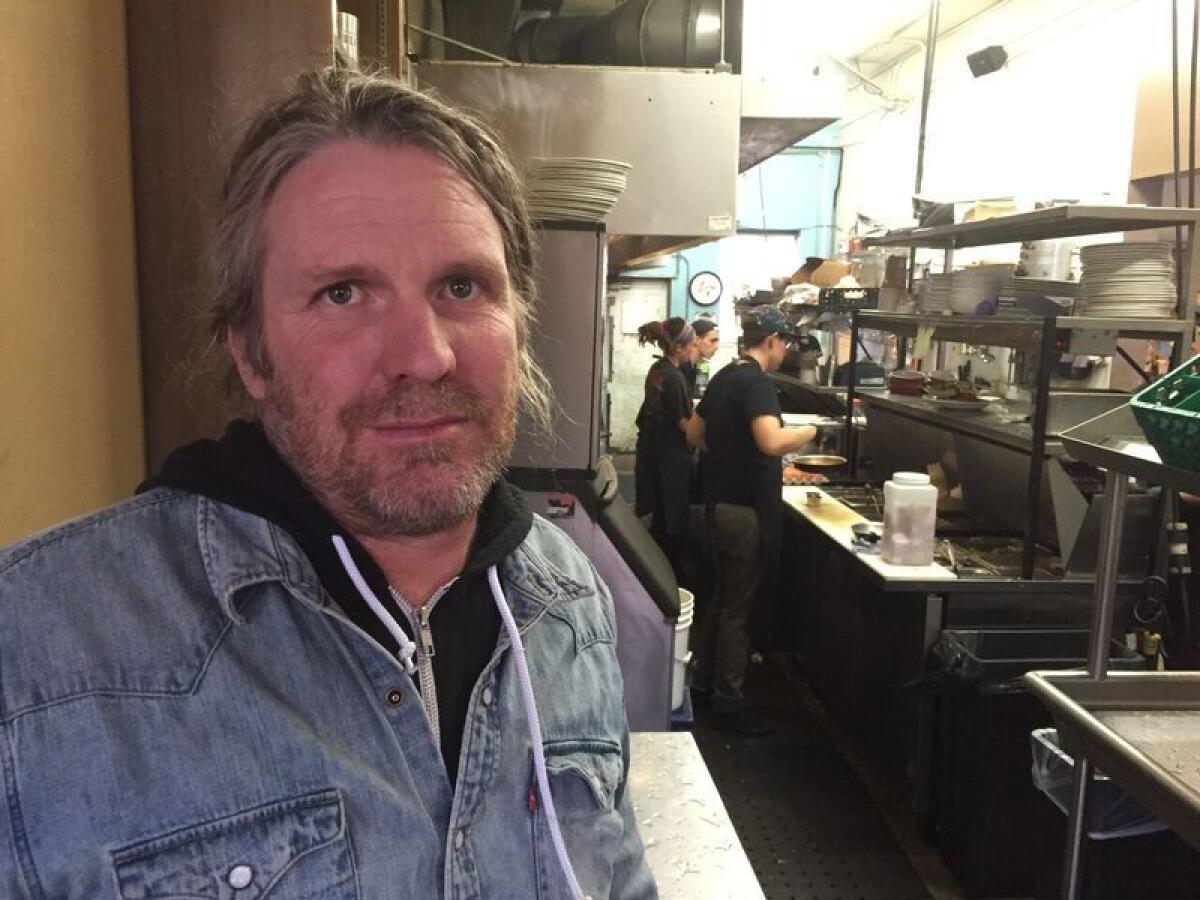Colorado’s pot paradox: Recreational marijuana is legal, but it’s tough to find a place to consume it

- Share via
Reporting from denver — Surveying the noisy lunchtime crowd at the popular City O’ City restaurant here, owner Daniel Landes considered his options.
A few days earlier, Denver voters had approved the use of cannabis in bars, restaurants and other public places, opening for Landes and other business owners a new world of possibilities.
There was the comedy club Landes owned upstairs. Maybe a cannabis and comedy night? And the yoga studio. Perhaps a pot-inspired yoga practice?
“This has been the missing ingredient,” Landes said. “You have people coming to Denver to enjoy legal pot, and they have had no place to use it.”
You have people coming to Denver to enjoy legal pot, and they have had no place to use it.
— Daniel Landes, Denver restaurant owner
But the options quickly narrowed late Friday after state licensing authorities weighed in with a new rule saying bars and restaurants with liquor licenses could not allow pot use on the premises. The Colorado Department of Revenue said it made the decision after talks last summer with the liquor industry, health experts and groups such as Mothers Against Drunk Driving.
In a news release, state officials said the new rule prohibiting “dual consumption” of alcohol and pot is in the best interest of public health and safety. Using both substances, they said, increases the risk of motor vehicle crashes more than using just one.
The Colorado Restaurant Assn. agreed, saying marijuana use in bars and restaurants “will dramatically increase the liability risks for these establishments.”
The surprise move put a damper on what many were heralding as the next step in the normalization of cannabis in Colorado and the nation.
Pot advocates accused the state of openly fighting a turf battle on behalf of the liquor industry. The state denied that, saying the ruling was not tied to the passage of the new marijuana measure.
“They seem to think it’s fine for patrons of bars and concert venues to get blackout drunk, but unacceptable for them to use a far less harmful substance like marijuana instead,” said Mason Tvert, spokesman for the National Marijuana Policy Project. “This rule will not prevent bar-goers from consuming marijuana, but it will ensure that they consume it outside in the alley or on the street rather than inside of a private establishment.”
This latest twist in Colorado’s roiling cannabis landscape is probably being watched closely by the ever-increasing slate of states who have legalized pot.
In 2012 Colorado and Washington became the first states to make recreational marijuana legal. The District of Columbia and six other states have followed, including California this month. The newcomers are looking to these pioneers for clues into what works, what doesn’t and how to navigate the inevitable conflicts with the federal government which still considers pot an illegal drug.
Backers of Denver’s new marijuana law, known as Initiative 300, say even if it’s been somewhat neutered, it still goes a long way toward addressing a central paradox of Colorado’s weed policy — pot may be legal here but finding a place to eat, vape or smoke it is another matter.
Tourists who visit Denver for the marijuana quickly discover that hotels, bars and restaurants usually ban it. Some end up smoking pot in their rental cars or in a handful of legalized “cannabis clubs” or marijuana-friendly bed and breakfasts.
“You have seen a dramatic rise in arrests in Colorado for public consumption of pot. People are using it in the parks and sidewalks where they shouldn’t,” said Kayvan Khalatbari, co-owner of Denver Relief Consulting, who campaigned in favor of the initiative. “Our hope is that [Initiative 300] will reduce public consumption.”
He also thinks it will open up new venues for marijuana use in places such as art galleries and massage therapy businesses.
Two years ago, the Colorado Symphony Orchestra tried to hold a public fundraising event in Denver called “Classically Cannabis” with attendees invited to bring their own pot. The orchestra switched the event to a private affair after the city warned that public consumption of marijuana was illegal.
While that sort of event will likely be easier to organize now, the new law comes with considerable caveats.
Businesses wanting to allow weed on the premises must first win approval of at least one neighborhood organization. Customers, who must bring their own pot, can vape or use marijuana edibles inside but have to smoke outside. That could annoy neighbors or run afoul of the state’s strict clean air standards. And the law is actually a four-year pilot program that ends in 2020 unless voters make it permanent.
Despite the challenges, many believe the measure will help normalize pot use.
“This is a groundbreaking law that reflects the shift in public attitude toward marijuana,” Tvert said. “The first was legalizing marijuana and now the next step is to ensure that adults who legally purchase it have a place they can legally use it.”
Stacey Mulvey, 38, is a Denver yoga instructor eager to include pot in her classes. “This law enables me to be able to start my own place and be above board in a community that approves,” she said.
Mulvey has created “marijuasana,” a yoga practice blending cannabis with physical movement.
“It deepens the experience on a physical and emotional level for me,” Mulvey said. “It’s something that I really hope people take the opportunity to experience.”
Not everyone is so enamored of the law. In fact, the Nov. 8 vote was so close it wasn’t officially called until Nov. 15, with 53.5% of residents voting in favor of it. Gov. John Hickenlooper, a Democrat, opposed the measure.
Rachel O’Bryan, campaign manager for the main group opposing the initiative, Protect Denver’s Atmosphere, led the fight against the measure.
“Do I think Denver will be the Amsterdam of the U.S.?” she asked. “Yes — at least temporarily.”
She is calling on the Colorado attorney general to investigate the legality of the ordinance, which she sees as threatening both the literal and cultural atmosphere of Denver. “We used to have a problem with people smoking pot in the parks and now they will be smoking in our neighborhoods,” she said.

Back at City O’ City, Landes, 45, was still debating how best to take on this new challenge.
“There is a lot of pent-up demand for this kind of thing,” he said. “But I want to see what hoops I have to jump through first.”
Aside from expanding his business, Landes sees something bigger here. He believes Colorado should lead the nation in innovative approaches to marijuana.
“We started it and we should remain the tip of the spear,” he said. “It’s a competitive world. The pot industry is huge and only getting bigger.”
Kelly is a special correspondent.
ALSO
Obama confronts an uncertain future on trade with the likely death of his signature TPP deal
North Carolina governor’s race still undecided with thousands of votes to be finalized
In a first for Latin America, Uruguay rolls out program legalizing marijuana
More to Read
Sign up for Essential California
The most important California stories and recommendations in your inbox every morning.
You may occasionally receive promotional content from the Los Angeles Times.










